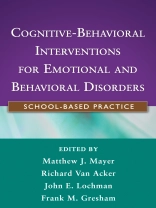Evidence based and practical, this book presents state-of-the-science approaches for helping K–12 students who struggle with aggressive behaviors, anxiety, depression, ADHD, and autism. It explains the fundamentals of cognitive-behavioral intervention and reviews exemplary programs that offer powerful ways to reach at-risk children and adolescents. Leading authorities thoroughly describe the process of assessment, treatment planning, implementation, and program evaluation. What makes the book unique is its focus on the nitty-gritty of school-based intervention, including how to integrate mental health services into the special education system, overcome obstacles, and provide needed skills to school personnel.
Tabla de materias
I. Foundations of Cognitive-Behavioral Interventions
1. Historical Roots, Theoretical and Applied Developments, and Critical Issues in Cognitive-Behavioral Modification, Matthew J. Mayer and Richard Van Acker
2. Intervention Development, Assessment, Planning, and Adaptation: The Importance of Developmental Models, John E. Lochman and Frank M. Gresham
3. Methodological Issues in Research Using Cognitive-Behavioral Interventions, Frank M. Gresham and John E. Lochman
4. Cognitive-Behavioral Interventions and the Social Context of the School: A Stranger in a Strange Land, Richard Van Acker and Matthew J. Mayer
II. Cognitive-Behavioral Interventions for Anger/Aggression
5. Cognitive-Behavioral Interventions for Anger and Aggression: Review of Research and Research-to-Practice Issues, Stephen W. Smith, Julia A. Graber, and Ann P. Daunic
6. Managing Anger and Aggression in Students with Externalizing Behavior Problems: Focus on Exemplary Programs, W. M. Nelson III and Janet R. Schultz
III. Cognitive-Behavioral Interventions for Anxiety/Phobic Disorders
7. Cognitive-Behavioral Therapy for Anxious Youth in School Settings: Advances and Challenges, Adam S. Weissman, Diana Antinoro, and Brian C. Chu
8. Cognitive-Behavioral Treatment for Childhood Anxiety Disorders: Exemplary Programs, Gretchen Schoenfield and Richard J. Morris
IV. Cognitive-Behavioral Interventions for Depression
9. Cognitive-Behavioral Interventions for Depression in Children and Adolescents: Meta-Analysis, Promising Programs, and Implications for School Personnel, John W. Maag, Susan M. Swearer, and Michael D. Toland
10. Cognitive-Behavioral Interventions for Depression during Childhood, Kevin D. Stark, Jenny Herren, and Melissa Fisher
V. Cognitive-Behavioral Interventions Addressing Other Needs
11. Attention-Deficit/Hyperactivity Disorder, George J. Du Paul, Lauren A. Arbolino, and Genery D. Booster
12. Cognitive-Behavioral Interventions for Students with Autism Spectrum Disorders, Laura Grofer Klinger and Amie Williams
VI. The Future of Cognitive-Behavioral Interventions
13. The Cognitive–Ecological Model: Paradigm and Promise for the Future, Jaleel Abdul-Adil, Patrick H. Tolan, and Nancy Guerra
14. Future Challenges to Cognitive-Behavioral Interventions in Practice and Policy, Michael M. Gerber and Emily Solari
Sobre el autor
Matthew J. Mayer, Ph D, is Assistant Professor of Educational Psychology in the Graduate School of Education at Rutgers, The State University of New Jersey. He is actively engaged in research on school violence and disruption, as well as in developing new models of graduate training for teachers and allied professionals that integrate professional preparation in cognitive-behavioral methods. Dr. Mayer is President of the Consortium to Prevent School Violence.
Richard Van Acker, Ed D, is Professor of Special Education at the University of Illinois at Chicago. His research involves efforts to prevent the development of serious antisocial behavior in children and youth, with a special focus on violence and aggression and the social interaction between teachers and their students. Formerly President of the Council for Children with Behavioral Disorders, Dr. Van Acker has written over 100 publications.
John E. Lochman, Ph D, ABPP, is Saxon Professor Emeritus in Psychology, Interim Director of the Alabama Life Research Institute, and Director Emeritus of the Center for Prevention of Youth Behavior Problems at the University of Alabama. He is also Adjunct Professor of Psychiatry and Behavioral Sciences at the Duke University Medical Center. A clinical psychologist, Dr. Lochman has authored more than 400 scientific articles, chapters, and books on the causes and consequences of highly aggressive behavior in childhood, and on the effects of intervention for this behavior. His current focus is research on dissemination, implementation, and adaptation of interventions. Dr. Lochman has served as Editor-in-Chief of the Journal of Abnormal Child Psychology and is a former President of the Society for Child and Family Policy and Practice (Division 37 of the American Psychological Association) and the American Board of Clinical Child and Adolescent Psychology. He is a recipient of the Distinguished Career Award from the Society of Clinical Child and Adolescent Psychology (Division 53 of the American Psychological Association).
Frank M. Gresham, Ph D, is Professor in the Department of Psychology at Louisiana State University. He is a Fellow of the American Psychological Association (APA) and of APA Divisions 16 (School Psychology), 5 (Quantitative and Qualitative Methods), and 53 (Society for Clinical Child and Adolescent Psychology). He is a recipient of the Lightner Witmer Award and the Senior Scientist Award from APA Division 16. Dr. Gresham is one of the few psychologists to be awarded Fellow status in the American Association for the Advancement of Science. His research and more than 260 publications address topics including social skills assessment and intervention, response to intervention, and assessment and interventions for students with emotional and behavioral disorders. He is codeveloper of the Social Skills Improvement System Rating Scales.












